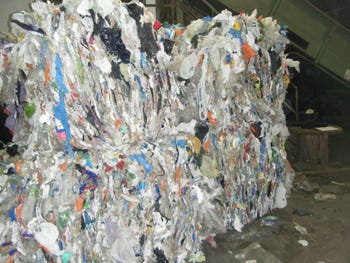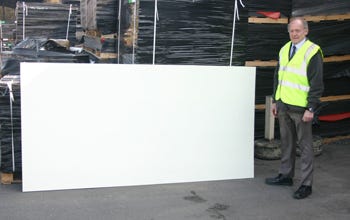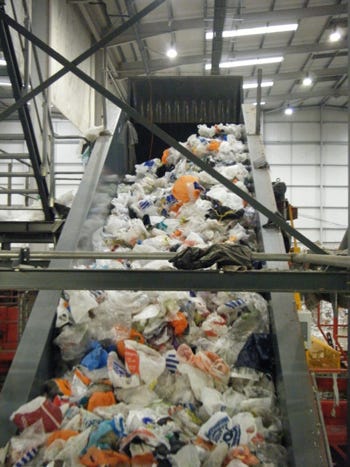Closed-loop recycling of post-consumer and retail waste plastic films could become a full-scale commercial reality within four years with the plastic converted into refuse sacks, external billboards, shelving, and in-store displays. Axion Consulting came to that conclusion following the successful outcome of some recent feasibility trials.
November 21, 2011
Closed-loop recycling of post-consumer and retail waste plastic films could become a full-scale commercial reality within four years with the plastic converted into refuse sacks, external billboards, shelving, and in-store displays. Axion Consulting came to that conclusion following the successful outcome of some recent feasibility trials.
Axion worked with CeDo, Centriforce Products and Protomax Plastics on a series of demonstration trials of post-consumer films sourced from a leading retailer's front- and back-of-store collections.
Axion commingled films |
Axion commingled films converted to sheet |
Axion commingled films |
Axion and industry partners undertook tests to collect and recyle commingled post-consumer plastic films into different products, including extruded sheet (middle). |
"Consumers want to see their plastic waste given a new second life as they're now far more conscious of what they're throwing away," said Axion Director Roger Morton. "Ultimately, consumer demand will drive this whole closed-loop recycling process."
The trial at CeDo's Telford facility produced refuse sacks that met existing product specifications using 100% UK-sourced recycled content from household waste. Previously European recyclate had to be used due to waste quality issues here, but now CeDo is working with retailers to launch new products.
Centriforce and Protomax's successful manufacturing trials focussed on fabricating boards from comingled film waste that could be used for a variety of applications, such as bill boards, security panels and shelving. Both firms are continuing to work on product specifications and with retailers to open up market opportunities.
CeDo made trash bags at its manufacturing plant in Telford utilizing bown-film extruders, while Centriforce created a panel product via sheet extrusion at its Liverpool site, and Protomax Plastics used compression moulding at its pilot scale facility in Swansea for panel manufacturing.
The post-consumer recyclate Axion sourced was pre-processed on two different processing lines at Ecoplast, with one line of material successfully blown into refuse sacks. This material did contain higher levels of polypropylene and gas than the Sainsbury's material, but the contamination was still low enough to be blown into trash bags. The other line required a further degassing stage at CeDo before it was successfully blown into trash bags.
The sacks produced in all three manufacturing trials contained either 13.5% (single layer) or 27% (double layer) trial post-consumer recyclate. This replaced 50% and 100%, respectively, of the existing post-consumer recyclate used by CeDo, which until this project has needed to be sourced from Europe.
Since low-density polyethylene (LDPE) film can be difficult to remove from other types of plastics and paper, the Biffa MRF is equipped with several Near Infrared (NIR) optical sorters.
The current setup of the plant and operation of the sorters results in a film stream with relatively high levels of contamination in order to produce a paper stream of a high purity. The film stream is classified as 'Class C' film by Biffa and is baled into 750kg bales. You can read the full report here.
About the Author(s)
You May Also Like





